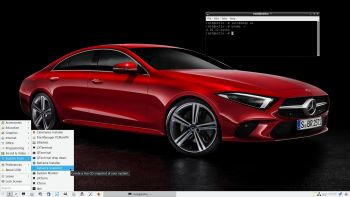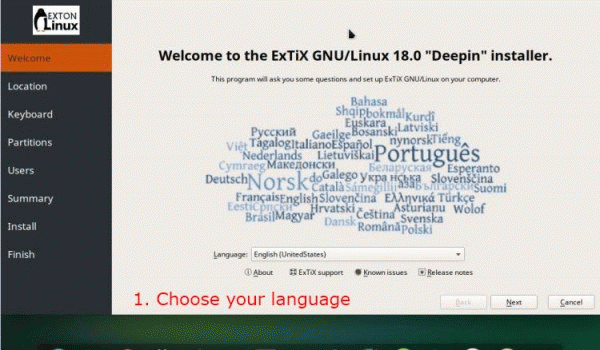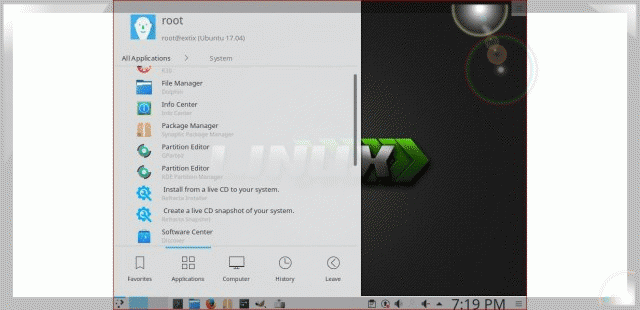ExTiX 18.10 – based on Ubuntu “Cosmic Cuttlefish” – with LXQt 0.13.0, Refracta Tools, Calamares Installer and kernel 4.18.12-exton – a non-efi Build 181006
 I have made a new extra version of ExTiX – The Ultimate Linux System. I call it ExTiX 18.10 LXQt Live DVD. It is for non-efi computers and VirtualBox/VMware. I.e. you can use the Calamares Installer also in for example VirtualBox and VMware. Which means that you can install ExTiX in any language.
I have made a new extra version of ExTiX – The Ultimate Linux System. I call it ExTiX 18.10 LXQt Live DVD. It is for non-efi computers and VirtualBox/VMware. I.e. you can use the Calamares Installer also in for example VirtualBox and VMware. Which means that you can install ExTiX in any language.
ABOUT
ExTiX 18.10 LXQt DVD 64 bit is based on Debian and upcoming Ubuntu 18.10 Cosmic Cuttlefish (to be released 181018). The original system includes the Desktop Environment Gnome. After removing Gnome I have installed LXQt 0.13.0. LXQt is the Qt port and the upcoming version of LXDE, the Lightweight Desktop Environment. It is the product of the merge between the LXDE-Qt and the Razor-qt projects: A lightweight, modular, blazing-fast and user-friendly desktop environment. NOTE: This ExTiX LXQt Build is for installation to non UEFI-enabled computers and VirtualBox/VMware.
The system language is ENGLISH.
Used KERNEL
My special kernel 4.18.12-exton corresponding Kernel.org’s latest stable kernel 4.18.12. You can download “my” kernel if you want to use it another Ubuntu/Debian system.
NEWS ABOUT ExTiX 18.10 Build 181006 with the LXQt Desktop environment
1. ExTiX LXQt is based on upcoming Ubuntu 18.10 Cosmic Cuttlefish. LXQt 0.13.0 is used as Desktop environment. All packages have been updated to the latest version by 181006. Kernel 4.18.12-exton is used. (Kernel.org‘s kernel 4.18.12).
2. Firefox has replaced Google Chrome as Web Browser. It’s now possible to watch Netflix movies also in Firefox (while running Linux).
3. I have replaced Ubuntu’s installer Ubiquity with Calamares Installer. Calamares is an installer framework. By design it is very customizable, in order to satisfy a wide variety of needs and use cases.
4. Other included important/useful packages are: LibreOffice, Thunderbird, GParted, Brasero, SMPlayer, GCC and other compilation tools so that you can install packages from source. Furthermore “all” multimedia codecs. Everything the average Linux user could wish for I would say.
WHAT’S SO SPECIAL about ExTiX and especially the new version from 181006?
1. The ExTiX ISO’s are ISO-hybrids, which means that they can very easily be transferred (copied) to a USB pen drive. You can even run ExTiX from the USB stick and save all your system changes on the stick. I.e. you will enjoy persistence!
2. Another big improvement is that both ExTiX versions can run from RAM. Use Boot alternative 4 (Load to RAM). When the system has booted up you can remove the disc (DVD) or USB stick. You’ll need at least 2 GB RAM to run ExTiX that way. Running from RAM means that the system will run faster than from DVD or USB stick. Everything will be superfast I would say!
3. All packages have been upgraded to the latest version by 181006.
4. You can install that you can install Nvidia’s proprietary graphics driver (without problems) if you like.
5. You can install ExTiX to hard drive using Calamares Installer on older non-efi computers (and VirtualBox/VMware). Which means that you can install ExTiX in your preferred language.
LOG IN to LXQt
You can run ExTiX live as root (superuser) or as the ordinary user live. Log in from Slim‘s Login Manager as root with password root in the LXQt version or as live with password live. After a hard drive installation you will get the opportunity to create your own normal user. When logged in as live you can use Sudo to become root. (Command: sudo su).
Wireless connections
I have replaced Wicd with NetworkManager. It now works better in ExTiX LXQt.
About Calamares Installer
Calamares is an installer framework. By design it is very customizable, in order to satisfy a wide variety of needs and use cases. Calamares aims to be easy, usable, beautiful, pragmatic, inclusive and distribution-agnostic. Calamares includes an advanced partitioning feature, with support for both manual and automated partitioning operations. It is the first installer with an automated “Replace Partition” option, which makes it easy to reuse a partition over and over for distribution testing. Watch a movie when I’ve started to install ExTiX Deepin using Calamares. See also a slideshow below showing the whole Calamares install process. The whole thing works in the same way in ExTiX LXQt.

Using Calamares you can choose language when the installation starts. When it’s ready everything will be in your chosen language!
About Grub and Calamares
If you already have one Linux system (for example Ubuntu) installed on your computer you can refrain from installing Grub during the installation of ExTiX LXqt (for example on /dev/sda5). Instead just add the lines below in Ubuntu. I.e. to /boot/grub/grub.cfg. Or start up Ubuntu and run the command sudo update-grub. Start data for ExTiX will then be added to Grub automatically.
menuentry ‘ExTiX LXQt (sda5) 181006’ –class gnu-linux –class gnu –class os $menuentry_id_option ‘gnulinux-simple-ccde3409-b7fc-4759-af5e-69b557c97467’ {
insmod gzio
insmod part_gpt
insmod ext2
set root=’hd0,gpt5′
if [ x$feature_platform_search_hint = xy ]; then
search –no-floppy –fs-uuid –set=root –hint-bios=hd0,gpt9 –hint-efi=hd0,gpt5 –hint-baremetal=ahci0,gpt5 ccde3409-b7fc-4759-af5e-69b557c97467
else
search –no-floppy –fs-uuid –set=root ccde3409-b7fc-4759-af5e-69b557c97467
fi
linux /boot/vmlinuz-4.18.12-exton root=UUID=ccde3409-b7fc-4759-af5e-69b557c97467 rw
initrd /boot/initrd.img-4.18.12-exton
}
NOTE:On certain computers you may have to add nomodeset to the boot line so it looks like this:
linux /boot/vmlinuz-4.18.12-exton root=UUID=ccde3409-b7fc-4759-af5e-69b557c97467 rw nomodeset
Or you may have to have a boot line looking like this:
linux /boot/vmlinuz-4.18.12-exton root=UUID=ccde3409-b7fc-4759-af5e-69b557c97467 rw quiet splash acpi_rev_override=1 nouveau.modeset=0
Install ExTiX to hard drive using Refracta Installer
Just start the install program Refracta Installer from the LXQt Menu (Refracta Installer). Then just follow the instructions. VirtualBox and VMware are examples of non UEFI-enabled computers. You can also use Calamares for installations in VirtualBox and VMware. This version of ExTiX is especially for non-efi computers.
Refracta Tools
While running ExTiX LXQt 18.10 live or from hard drive you can use Refracta tools (pre-installed) to create your own live installable Ubuntu system. A ten year child can do it! Watch a slideshow below. (The slideshow is for ExTiX Budgie 17.7, but Refracta tools works in the same way in ExTiX LXQt). You don’t even have to install ExTiX to hard drive before you can use the Refracta tools. If you have plenty of RAM you can create a new (your own!) Ubuntu system while running ExTiX from a DVD or a USB stick. Please note that the whole Refracta process (creating your new ISO) will only take 15 – 25 min! You’ll find the ISO in /home/snapshots. (Or change that in /etc/refractasnapshot.conf).
USB installation
Read my instruction.
Printing using Cups
It’s really very simple to install a printer in ExTiX/Ubuntu. First you have to install Cups (Common UNIX Printing System). Do it in Synaptic or use the command sudo apt-get install cups. Then open up Firefox and go to http://localhost:631/admin. See the following five screenshots showing when I added my local printer HP Photosmart Wireless in ExTiX LXQt.
1. Cups start page
2. Add the printer
3. Add a local printer
4. Configuration of the added printer
5. Printing a test document
Online photo editing with Fotojet
For “normal” photo editing you don’t need Adobe Photoshop or Gimp. Just go to fotojet.com (an all-in-one free online tool for photo editing, graphic design and photo collages) using Firefox.
Changing the root password
If you install ExTiX to hard drive you must/should immediately (for security reasons) manually change root’s password. This is because the installation program does not ask about a new root password. (Ubuntu original uses no root password). The root password is changed by running the command sudo passwd root. After installing ExTiX to hard drive, you can alternatively remove the root password altogether. This is done with the command sudo passwd root -l. NOTE: The Calamares installer do ask for a new root password.
Compatibility
A general truth: If an original system can run on a particular computer an Exton Build of the same original system can run on the same computer. I never change a Linux system for the worse in terms of auto configuration and hardware detection, etc. It happens that I replace the original kernel, but always to a “better” one with even more native support for various hardware etc. (Which I have done in this case).
THE IMPORTANCE of ExTiX LXQt now being based on Ubuntu 18.10 (UNSTABLE/DEVELOPMENT)
I don’t think it is too important since ExTiX LXQt doesn’t use complicated Desktop Environments like KDE, Gnome or Unity. Programs won’t crash or anything like that. And I haven’t discovered any bugs to report.
SCREENSHOTS
Screenshot of ExTiX 18.10 root Desktop – LXQt 0.13.0
Screenshot of ExTiX 18.10 live Desktop – LXQt 0.13.0
Calamares running in VMware in ExTiX 18.10
Refracta tools running while logged in as user live
Connections to Windows computers via PCManFM-qt using Samba
ExTiX running in VMware
ExTiX running in VirtualBox

DOWNLOAD
Download ExTiX 18.10 from SourceForge.net – Fast, secure and free downloads from the largest Open Source applications and software directory.

ExTiX 18.10 LXQt version can also be downloaded from the Swedish Linux Society’s server
md5sum extix-18.10-64bit-non-efi-lxqt-refracta-calamares-1910mb-181006.iso

Read about my Android-x86 Systems – Oreo, Nougat, Marshmallow, Lollipop and KitKat at
andex.exton.net – latest is AndEX Oreo 8.1!
and
about my Oreo, Nougat, Marshmallow and Lollipop versions for Raspberry Pi 3/2 at
raspex.exton.se – latest is RaspAnd Oreo 8.1!


3 thoughts on “ExTiX 18.10 – based on Ubuntu “Cosmic Cuttlefish” – with LXQt 0.13.0, Refracta Tools, Calamares Installer and kernel 4.18.12-exton – a non-efi Build 181006”